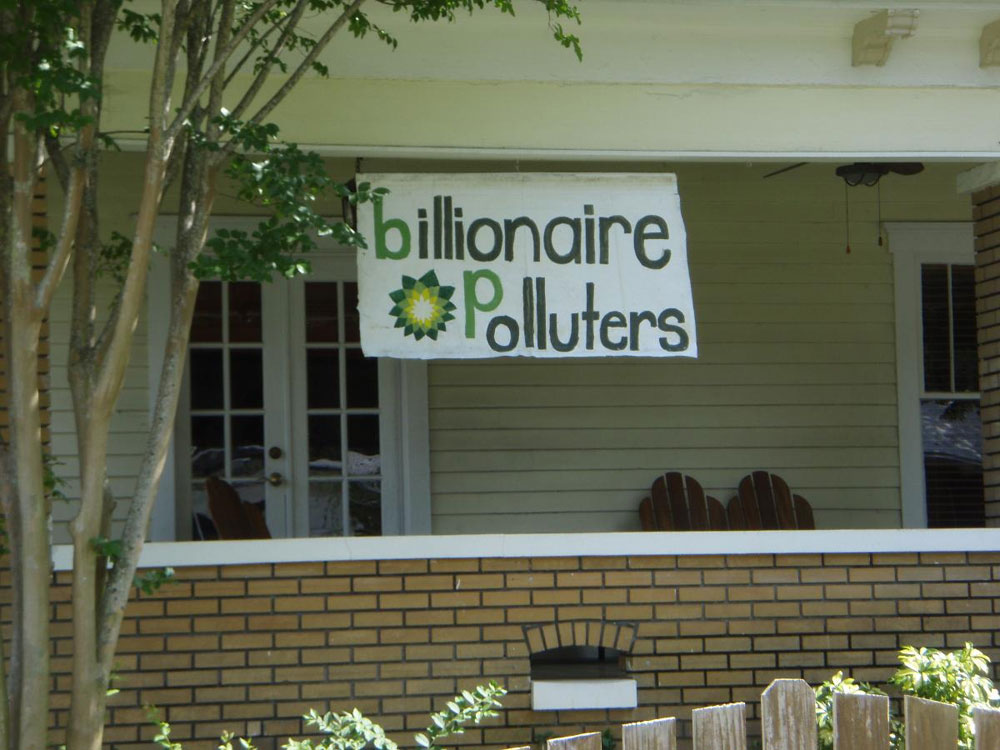
June 10, 2019; Hyperallergic
Last week, a horde of protesters showed up at London’s National Portrait Gallery to protest BP’s 30-year sponsorship of the Portrait Award. They handed out counterfeit parody programs and painted live portraits of BP executives and climate campaigners from West Papua, Mexico, Samoa, and the US Gulf Coast.
Members of the protest group BP or Not BP? blocked the gallery’s main entrances. Some even chained themselves to doorways and gates to prevent guests from entering. (The museum directed attendees to climb over a wall to attend the ceremony.) Despite escalating protests to the organization’s partnership with BP, the show did go on as planned.
The relationship between “leviathan oil company” and “leading benefactor to Britain’s cultural institutions” gained national attention when awards judge and artist Gary Hume, along with Culture Unstained, wrote a letter published by the BBC on June 7, 2019. Upon witnessing the Extinction Rebellion “die-ins” that are springing up across London’s major cultural institutions, Hume was compelled to make his views public.
Hume wrote to gallery director Nicholas Cullinan, “There should be no role for an oil company in the artistic decisions of any cultural organization, and especially not in determining the winner of the world’s leading portrait award. This is the 30th year of BP sponsoring the Portrait Award, and I would argue that 30 years is enough. As the impacts of climate change become increasingly apparent, the Gallery will look more and more out of step by hosting an oil-branded art prize.”
The museum responded:
The sponsorship of the Portrait Award by BP is now in its 30th year. This support directly encourages the work of talented artists and helps gain wider recognition for them and enables free admission for the public, over 275,000 visitors in London last year. Since 2010 BP has also given special support to the BP Portrait Award: Next Generation program which encourages 14- to 21-year-olds to become involved in painted portraiture.
In an email to Hyperallergic, Sarah Horne, a member of BP or Not BP?, wrote:
Sign up for our free newsletters
Subscribe to NPQ's newsletters to have our top stories delivered directly to your inbox.
By signing up, you agree to our privacy policy and terms of use, and to receive messages from NPQ and our partners.
The climate crisis is unfolding at terrifying speed. Those who have done least to cause the problem are worst hit, while oil companies like BP continue to rake in massive profits while actively making the problem worse. BP spends tens of millions every year lobbying against climate action and blocking clean energy alternatives, while pushing for access to yet more oil and gas that we cannot afford to burn. The National Portrait Gallery needs to stop giving this destructive and irresponsible company a veneer of respectability it does not deserve.
Culture Unstained is a nonprofit dedicated to creating a sea change among cultural institutions who accept fossil fuel sponsorship. It calls for a nonpartisan, inclusive citizens’ assembly to consider balanced information from experts and stakeholders and make recommendations that brings people together to learn, deliberate and make recommendations. BP or Not BP is a national network of “actor-vists” who are “performing disobedient theater using public forums to take on cultural institutions’ accepting funds from big oil companies.
The question is not uncomplicated. Andrew Dickson, in an article that appeared in the Guardian back in 2016, asks where one is to draw the line. He suggests the distinction between “good money” and “bad money” is fuzzy, especially as it relates to climate change. How “clean” does clean have to be? Is money that extracts oil worse than being financed by a car-maker? What about foundations that have made their fortune through investments in those companies?
Then, there’s the fact that the British government has continued to slash funding to the arts. Where would the money go if not toward the social good? Isn’t it better that it provide education and entertainment to the public than go into the pockets of shareholders? While Dickson does not answer these questions, he says it’s time for a widespread public debate on the subject.
Museums would say they’re working on the problem. The Portrait Gallery’s 2015 Ethical Fundraising Policy emphasizes their “responsibility to ensure donations are not accepted from questionable or inappropriate sources,” including those “in conflict with the objectives and values of the gallery.” It is possible that next year’s BP sponsorship will be referred to the ethics committee for appraisal by the gallery’s trustees. BP’s contract with the National Portrait Gallery was renewed in 2016 to extend into 2022.
That being said, in March, the museum announced the decision to refuse a $1.1 million donation from the Sackler Trust. In a separate letter to Cullinan, eight artists and former prize winners wrote, “We write to you as former winners, shortlisted artists and exhibitors in the BP Portrait Award. The refusal of the Sackler Trust grant demonstrated that the Gallery is indeed prepared to reject funding when a donor does not share its values. We urge you to apply this ethical rigor to your relationship with BP, and recognize it is a partnership that can no longer be defended.” Does this signal another tipping point?—Meredith Betz
Correction: This article has been altered from its initial form to acknowledge that the NPG came to a mutual agreement not to accept a donation from the Sackler Trust, not the Sackler Foundation. NPQ regrets the error.













